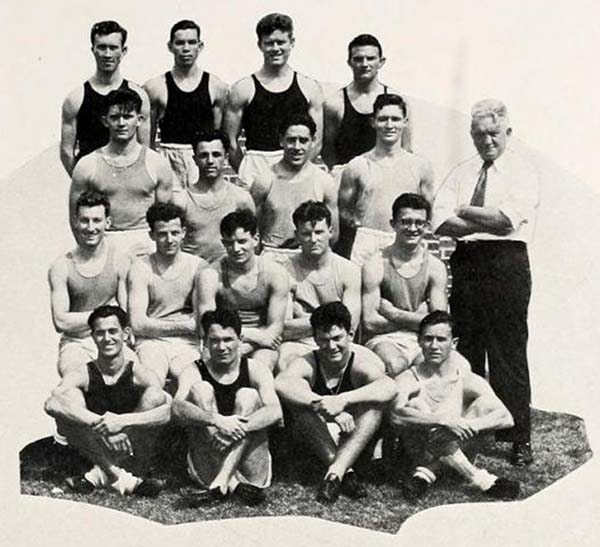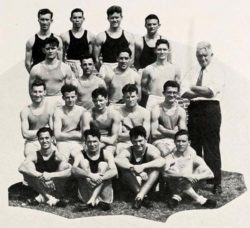Tad Gormley
In 1965, New Orleans's City Park Stadium was renamed to honor Olympic coach Tad Gormley.

Courtesy of Internet Archive
Loyola Track Team, 1933. The Wolf (Publication)
F ew coaches and trainers can say that they guided a young athlete to the Olympics; however, Francis Thomas “Tad” Gormley could. Not only did he bring four young men from New Orleans to the 1932 Olympics in Los Angeles, California, but two of them would win gold medals in different sports: Eddie Flynn, the welterweight boxing champion, and Emmett Toppino, a member of the men’s 400-meter relay team. In 1965 Gormley was posthumously honored when a stadium in New Orleans’s City Park, originally built in 1937 by the Works Progress Administration, was named in his honor.
A native of Cambridge, Massachusetts, Gormley was born in 1884. After successfully training runners who won the Boston Marathon in 1904 and 1906, the twenty-three-year-old Gormley was hired to manage the Young Men’s Gymnastic Club in New Orleans, which is today part of the New Orleans Athletic Club. Gormley left the Gymnastic Club in 1914 to become the track coach at Tulane University. There he continued to organize and sponsor “The Gormley Games,” a weekly, informal open track meet that took place wherever Gormley happened to coach. In 1921 he left Tulane to serve as the men’s track coach and men’s basketball coach at Louisiana State University (LSU) in Baton Rouge.
In 1927 Gormley returned to New Orleans to serve in multiple capacities at Loyola University. He coached track, boxing, and basketball, and he was head trainer for the football program. During his time at Loyola, Gormley continued to coach track at Tulane and LSU, an accommodation that would be unheard of in present-day college athletic departments.
He accompanied four of his athletes to the 1932 Amateur Athletic Union championships in Los Angeles, the qualifying event for the United States Olympic team. Brothers Eddie and Dennis Flynn earned spots on the boxing team, and Rolland Romero and Emmett Toppino became part of the track and field team—Romero for the triple jump and Toppino in the sprint relays. Eddie Flynn and Toppino would be awarded Olympic gold medals. Several of Gormley’s athletes would also compete in the 1936 Olympics in Berlin.
In 1938 Gormley left Loyola University to assume the position of athletic director at the newly erected City Park Stadium. For the next thirty years he would provide advice, training, and support to thousands of young athletes in a wide variety of sports.
Gormley was inducted into the National Athletic Trainers’ Association Hall of Fame in 1962, the Louisiana Sports Hall of Fame in 1968, the Greater New Orleans Sports Hall of Fame in 1971, and the Louisiana Athletic Trainers’ Hall of Fame in 1990.
He died in New Orleans in 1965.
